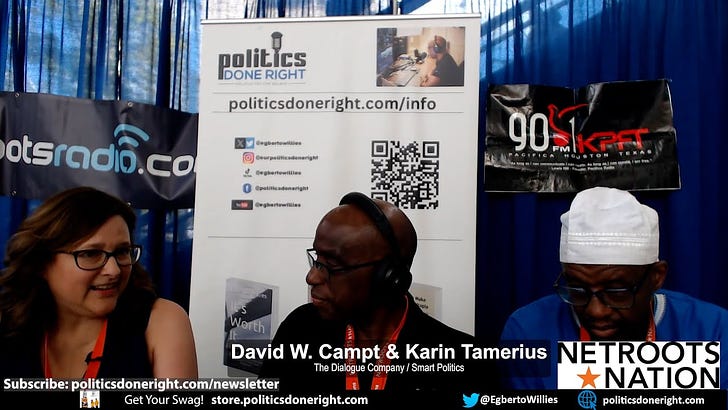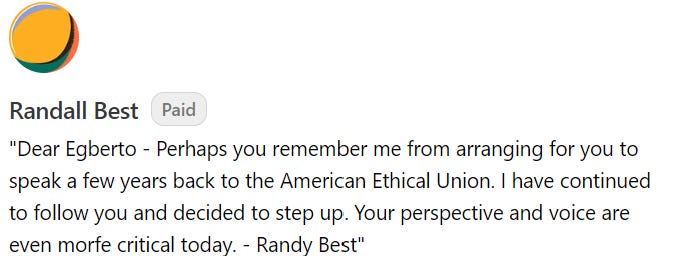David Campt & Karin Tamerius on how to speak to the other side
Join David Campt and Karin Tamerius as they share insights on fostering compassionate, effective dialogues across political divides.
THANK YOU IN ADVANCE FOR YOUR SUPPORT! We are feverishly working triple time to ensure we win this existential election.
We are grateful for our Paid Subscribers and Free Subscribers. In this political climate, we need several hundred more Paid Subscribers. Misinformation funded by the deep pockets of our Oligarchy floods the internet. We are using all our platforms on-air, online, and in publications to counter that. We ask that you invest the equivalent of less than a coffee to ensure we can keep doing this effectively. Please invest in a Democracy that serves all of us by becoming a paid subscriber. It comes with many benefits.
Multiracial organizing to beat the Oligarchy
Join David Campt and Karin Tamerius as they share insights on fostering compassionate, effective dialogues across political divides, particularly on race, to create a more unified and understanding society.
Fostering meaningful dialogue between people with opposing views has become more challenging but also more necessary than ever. At Netroots Nation 2024, political communication experts David Campt and Karin Tamerius shared their insights on bridging the gap, especially when discussing contentious issues like race and identity. Campt, founder of The Dialogue Company, and Tamerius, founder of Smart Politics, focus on teaching progressives how to engage in more productive conversations, particularly with conservatives. They emphasize that while emotional reactions like outrage may feel satisfying in the moment, they often deepen divisions rather than promote understanding. Instead, they advocate for compassion-based strategies that lead to more impactful and lasting change.
Key Points:
Understanding the Communication Divide: David Campt highlights that many white progressives struggle to talk effectively about race within their own circles and with those who disagree. While progressives generally acknowledge the ongoing impact of racism, conservatives tend to downplay its significance. The challenge is not just addressing racism but doing so in ways that invite dialogue rather than confrontation.
The Role of Trauma in Conversations: Karin Tamerius points out that trauma significantly shapes political perspectives. Whether related to race, gender, or personal experiences, trauma affects how people engage in political discussions. Recognizing this can help progressives approach conversations with empathy, understanding that emotional baggage often influences political opinions more than pure ideology.
Outrage vs. Compassion: Campt and Tamerius emphasize that “outrage is a drug.” While it can feel good to react with indignation when confronted with racist or bigoted views, this approach often hardens the other person’s stance. Instead, they advocate for compassion-based communication strategies that foster empathy and understanding, helping to soften resistance and open the door to change.
Relational Deep Canvassing: A key strategy discussed is relational deep canvassing, which combines elements of relational organizing (mobilizing people within your network) and deep canvassing (engaging in thoughtful, long conversations). By focusing on meaningful dialogue with people they already know, progressives can have a greater influence on their friends, family, and colleagues, encouraging them to rethink their positions.
The Importance of Empathy in Political Conversations: Campt and Tamerius stress the importance of approaching political conversations with empathy and patience. They argue that understanding the other person’s life experiences and emotional triggers is crucial for creating a space where real dialogue can happen. This requires progressives to move beyond judgment and embrace a more compassionate approach, even when the issues are deeply personal and painful.
Conclusion:
David Campt and Karin Tamerius offer a blueprint for productive political conversations in an era of deep division. Their focus on compassion, empathy, and understanding provides a valuable alternative to the often destructive forces of outrage and indignation. By adopting strategies like relational deep canvassing and trauma-informed communication, progressives can better navigate contentious discussions on race, identity, and other polarizing topics. This approach promotes healthier political discourse and fosters meaningful change that can shift hearts and minds, one conversation at a time.
Viewers are encouraged to subscribe and join the conversation for more insightful commentary and to support progressive messages. Together, we can populate the internet with progressive messages that represent the true aspirations of most Americans.
Can we count on your help to reach our goal of 300 needed new paid subscriptions by the end of the month?
The other side has big donors and everyday citizens who invest heavily in platforms that lie and misinform. All we have is you. So, please invest in our media outlet by clicking the subscribe button below to become a paid subscriber. You won’t miss that coffee, but it will make a difference in our politics as we spread the truth about our policies and progressive politics. All paid subscribers get to read my five books on this platform and all subsequent books I write. They will also be privy to subsequent incentives.






